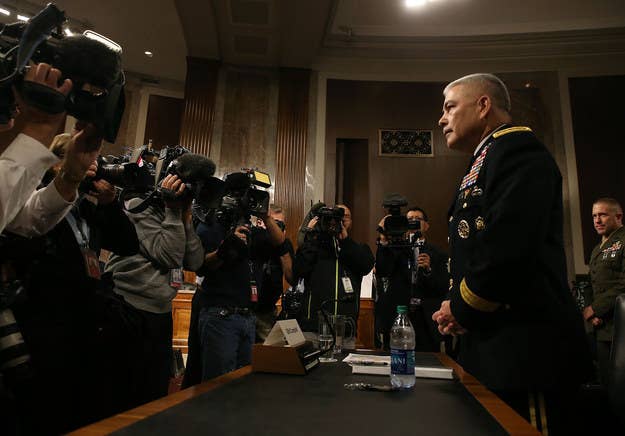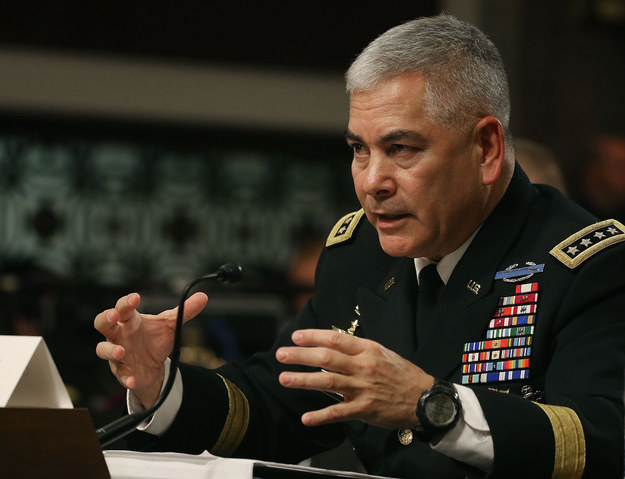
Gen. John Campbell, the top U.S. commander in Afghanistan, vowed Tuesday that the Pentagon's investigation into the airstrikes that hit a Médecins Sans Frontières clinic in the country on Saturday would be "thorough, objective, and transparent."
Appearing before the Senate Armed Services Committee for the fist time in eight months, Campbell opened his testimony by discussing the "tragic loss of lives" in the U.S. airstrike, which killed 22 staff and patients at the MSF clinic in Kunduz.
White House Press Secretary Josh Earnest mistakenly told reporters at a press briefing Tuesday the Justice Department was investigating the incident, but later corrected himself, saying he meant to refer to the Defense Department.
Officials with the medical charity, which is known as Doctors Without Borders in English, have called the airstrike a possible war crime and demanded an independent investigation into the incident.
But Campbell said he had confidence three investigations into the incident -- conducted by NATO, the Department of Defense, and Afghanistan's government -- would bring the facts to light.
The four-star general acknowledged for the first time that the hospital was mistakenly struck. He added that a U.S. special forces unit was in the vicinity of the hospital and talking to the aircraft that dropped the bombs.
U.S. forces, he said, "would never intentionally target a protected medical facility," comparing his troops' actions to the Taliban's frequent attacks on civilians.
"No military in history has done more to avoid harming innocents," Campbell said of his forces.
However, in a statement issued before Campbell's testimony, MSF President Dr. Joanne Liu said the hospital was "deliberately bombed."
"Until proven otherwise, the events of last Saturday amount to an inexcusable violation of ... [international] law. We are working on the presumption of a war crime," she said.
"This attack cannot be brushed aside as a mere mistake or an inevitable consequence of war," Liu said.

The U.S. initially said that American forces were under attack from Taliban members taking up spots in the hospital and needed air support.
But on Monday, Campbell backtracked and said it was Afghan forces that were under fire and called in the airstrike.
Campbell reiterated those comments before the Senate Tuesday: "To be clear, the decision to provide aerial fires was a U.S. decision made within the U.S. chain of command," he said.
He said he had directed all members of U.S. forces to undergo in-depth training to prevent similar incidents in the future.
When asked how the personnel who dropped the bombs must be feeling, Campbell replied: "Every soldier, sailor, airman, marine, if they're involved in something like this that hurts."

Campbell said the past fighting season has been "fundamentally different" to years past due in part to the Taliban seeking to test the strength of Afghan forces fighting alone.
He said the Afghan government still "desire, need, and deserve our assistance," but warned that U.S. support should not be unconditional.
He also testified about recent media reports that U.S. soldiers were widely instructed to ignore the sexual abuse of boys by local Afghan troops.
The New York Times last month reported on the "policy" of U.S. service members not to intervene when allied Afghan commanders abuse children, even when such abuse occurs on military bases.
In the days following the report, Campbell vehemently rejected the notion of an implicit policy to ignore such abuse -- a stance he took again on Tuesday.
"We'll do everything within our power to defend and protect human rights," he said, adding that he had reminded the entire training force they were required to report any suspected human rights violations, including the sexual abuse of children by Afghan forces.
CORRECTION
The Defense Department, not the Justice Department, is investigating the bombing. An earlier version of this article quoted White House press secretary Josh Earnest saying the Justice Department was investigating, but he later said he misspoke.
